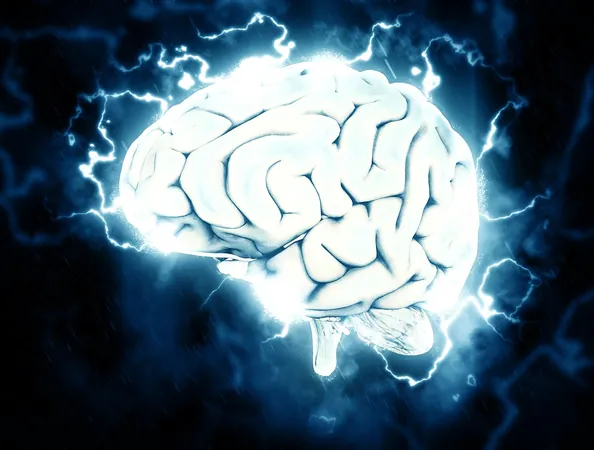
Breakthrough Study Reveals How Neurostimulation Could Revolutionize PTSD Treatment!
2024-09-24
Author: Wei Ling
Introduction
In an innovative study conducted by researchers at Brigham and Women's Hospital, startling new insights have emerged regarding the neurobiology of Post-Traumatic Stress Disorder (PTSD). By examining a cohort of 193 participants from the Vietnam Head Injury Study, the research team uncovered that individuals with damage to their amygdala—known as the fear center of the brain—were significantly less likely to develop PTSD. This landmark study has been published in the esteemed journal *Nature Neuroscience*.
Significant Findings
Dr. Shan Siddiqi, the leading psychiatrist at the Brigham's Center for Brain Circuit Therapeutics, emphasized the gravity of the findings, stating, “This is a very real brain disease, and we can localize it to certain brain circuits.” His remarks challenge the common misconceptions surrounding PTSD, emphasizing that it has no bearing on an individual’s mental strength or moral character.
Collaboration and Research Goals
Collaborating with several prestigious institutions, including Northwestern University, Brown University, and Duke University, Siddiqi aimed to establish a therapeutic target that could potentially revolutionize PTSD treatment methods. While it has been noted in previous studies that individuals with amygdala damage exhibit lower PTSD rates, the current research sought to delve deeper to identify precise therapeutic targets.
Challenges in Treatment
Dr. Michael Fox, a co-author of the study and director of the Center for Brain Circuit Therapeutics, noted the challenges of stimulating the amygdala due to its deep positioning in the brain, which complicates treatment without invasive procedures. The researchers have previously made strides in utilizing Transcranial Magnetic Stimulation (TMS) to effectively treat conditions such as depression and addiction. With this new insight, the team hopes to extend these techniques to combat PTSD, a condition that affects millions globally.
Data Analysis and Insights
The investigative team meticulously analyzed data from veterans who sustained penetrating traumatic brain injuries in Vietnam. Their assessment revealed that those with amygdala damage were less prone to developing PTSD, suggesting the activation of specific brain circuits may confer resilience against mental health challenges.
Case Studies and Results
Further examination of the participants indicated a compelling correlation between the structure of the brain circuit and the presence or absence of PTSD symptoms. “Trials that stimulated the identified circuit yielded promising results,” Fox explained, highlighting the potential for targeting this new therapeutic pathway through TMS.
Practical Applications and Limitations
In a compelling case study, a PTSD patient at Acacia Mental Health in California benefited from TMS after the treatment plan was tailored according to this cutting-edge research. While this case suggests the feasibility of the therapeutic target in practice, it is crucial to conduct comprehensive randomized controlled trials before the treatment can be offered widely.
Future Steps and Conclusion
Despite these promising developments, researchers acknowledge significant limitations. Currently, data is drawn solely from veterans, raising questions about whether these findings translate to non-veteran populations suffering from PTSD. Additionally, the impact of a patient's state—whether agitated or relaxed—during treatment remains unclear.
Dr. Fox remarks, “While more work remains to be done, we've taken an important step here to identify a therapeutic target for a condition in patients who desperately need better treatments.” This pioneering study could pave the way for new hope for countless individuals struggling with PTSD, reshaping the landscape of psychiatric treatment as we know it.
Stay Tuned!
Stay tuned for more updates on this groundbreaking research!

 Brasil (PT)
Brasil (PT)
 Canada (EN)
Canada (EN)
 Chile (ES)
Chile (ES)
 España (ES)
España (ES)
 France (FR)
France (FR)
 Hong Kong (EN)
Hong Kong (EN)
 Italia (IT)
Italia (IT)
 日本 (JA)
日本 (JA)
 Magyarország (HU)
Magyarország (HU)
 Norge (NO)
Norge (NO)
 Polska (PL)
Polska (PL)
 Schweiz (DE)
Schweiz (DE)
 Singapore (EN)
Singapore (EN)
 Sverige (SV)
Sverige (SV)
 Suomi (FI)
Suomi (FI)
 Türkiye (TR)
Türkiye (TR)